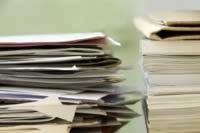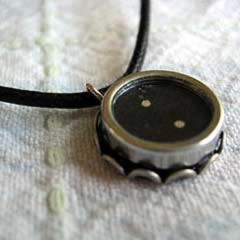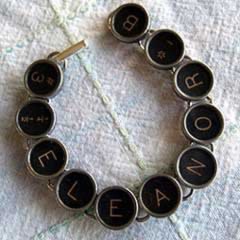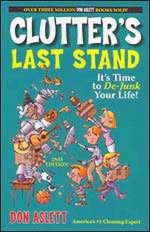Mystery Checks in the Mail
Earlier this month, Julie warned us that Macy's had flipped her store card and sold her data to Citibank. I recently experienced something similar.
A few months ago, I received some "advance checks" in the mail from Bank of America. You know the ones — the kind of checks your credit card uses to entice you so take a cash advance. The problem was, I don't have an account with Bank of America. I did once, but I closed it in December of 1998
I shredded the checks and didn't think much about it.
In Pursuit of Paperless Personal Finance
 I'm swamped with paper. This is partly because I'm a packrat, but mostly it's due to the never-ending bills, statements, receipts, policies, and special offers that flood my desk. The paperless office once seemed like a silly goal to me, but lately it's become a holy grail. Spurred by Leo's adventures in minimalism and my own desire to get rid of clutter, I've begun to explore ways to move my money into the 21st century.
I'm swamped with paper. This is partly because I'm a packrat, but mostly it's due to the never-ending bills, statements, receipts, policies, and special offers that flood my desk. The paperless office once seemed like a silly goal to me, but lately it's become a holy grail. Spurred by Leo's adventures in minimalism and my own desire to get rid of clutter, I've begun to explore ways to move my money into the 21st century.
Here are eight ways to begin moving toward paperless personal finance:
- Reclaim your mailbox. Use OptOutPrescreen.com to stop credit card and insurance offers. Stem the tide of junk mail with the Direct Marketing Association's mail preference service. Cancel unwanted magazine subscriptions.
- Consolidate accounts and close those you no longer use. Reduce the number of credit cards you carry. If you have bank accounts at multiple locations, combine them at a single bank. The fewer accounts you have to track, the less paper you have to deal with. (Be aware that closing unused credit card accounts will cause a temporary ding to your credit score.)
- Use electronic billing. If you have a choice between paper and paperless, opt for the latter. Not only will this reduce clutter, but it can also save you money. I save $2/month through electronic billing for my auto insurance. Now I'm considering whether it's worth the $5/month cost to sign up for electronic billpay through my credit union. When I calculate how much I'd save on stamps, and count the $2 I've already saved with my insurance company, I could move to completely electronic bill payments for a net cost of $1/month.
- Computerize your checkbook. For years, I've used Quicken to balance my checkbook. This is probably normal for young adults, but many of my middle-aged friends still balance their checkbook by hand. One couple I know began using Quicken to track their finances this summer, and are blown away by how easy it is to use. Even a simple spreadsheet can reduce the amount of paper you're shuffling.
- Photocopy documents. I have a friend who, at the end of each month, photocopies his financial documents and places them in a three-ring binder. He's been doing this for years. While not quite paperless, this is a great option if you don't have access to a scanner. It sure beats my stack of shoeboxes!
- Scan receipts. My accountant uses a $900 scanner that automatically converts documents to PDF files. You don't need anything so fancy. My sister-in-law scans her receipts and bills and saves them to her hard drive as jpegs, vastly reducing the amount of paper she keeps on hand.
- Use the web. Online apps offer smart ways to track your finances while reducing clutter. Due.com is a web-based personal finance program with a community element. Shoeboxed lets you scan or photograph your receipts and organize them online.
- Know which financial records to keep (and how long to keep them). Purge your archives. For years, I've kept every financial document that comes into my life. I literally have dozens of shoeboxes in storage filled with financial documents, most of which I no longer need. By learning which documents you need to keep, you can be sure that you're not storing useless paper.
Paperless personal finance isn't without its pitfalls, of course. Keep the following best practices in mind if you decide to pursue this route:
How to Find Great Deals on eBay
My friend Lisa is something of an eBay addict. I'll be at her house admiring something or other and she'll smile confidentially and whisper, "I got it off eBay."
She recently showed up at a dinner party wearing a smart cocktail dress. When the other women admired it she smiled confidentially and whispered, "I got it off eBay." At Christmas she made some crafty little things that amazed and delighted the recipients. When we asked how she came up with the idea she smiled confidentially and whispered, "I got it off eBay."


Money Day: Your Personal Finance Holiday
I opened my first checking account on the day I entered college. During registration, local banks set up tables at one end of the room. They all seemed the same to me. I chose the bank that gave me a free Frisbee. I did business with that bank for seventeen miserable years. I loathed that bank. They were constantly finding new and interesting ways to charge me money. If I hated it so much, why didn't I change? Because I never felt like I had the time. Besides, I had no idea where else to go.
Eventually the bank went too far. Because of some obscure procedural policy, I was charged three $30 overdraft fees in a single day. This kicked my ass into gear. .jpg) I took an afternoon off from work, closed my account, and started fresh at a local credit union. It was one of the best financial decisions I've ever made.
I took an afternoon off from work, closed my account, and started fresh at a local credit union. It was one of the best financial decisions I've ever made.
If I could solve one financial problem in a few hours, just imagine what I could do with an entire day. If you, too, have grand financial plans that you never seem to have time to fulfill, consider taking a personal Money Day. Choose a normal weekday (when banks and business are open), take time off work, and get things done. Don't worry that you're using a vacation day for "nothing" — this vacation day will repay you many times over, not just now but for years to come. Continue reading...
Clutter’s Last Stand: The Cost of Buying Things You Will Not Use
During the 1990s, I used credit cards to fund my every whim. I bought books and games and computers and gadgets. Now, ten years later, I'm still carrying a lot of that debt in the form of a home equity loan (into which  I rolled all my credit cards several years ago). I also still have a lot of the crap I bought.
I rolled all my credit cards several years ago). I also still have a lot of the crap I bought.
I have a plan for getting rid of the debt by next spring, but until recently I had no intention of getting rid of the things I had bought with the money. Instead, I let them take up space in the garage, in the workshop, in the basement. Physical reminders of my foolish purchases were all around me. The clutter was as much a mental burden as the debt!
Then a reader recommended Clutter's Last Stand: It's Time to De-Junk Your Life. Author Don Aslett is a cleaning zealot — reading this book opened my eyes. In a chapter called "The Economy of Clutter", Aslett lists the costs of clutter: Continue reading...
7 Essential Skills to Protect Yourself from Scammers
Sabino sent me an MSNBC article about the unfolding subprime lending crisis. The piece provides a glimpse at the deceptive practices used to prey on people like Kerrie Russo, who chose to refinance her mortgage on a promise of lower payments. When she failed to read her loan documents closely, she found herself deep in expanding debt. Though the mortgage broker lured her into this loan, she signed the papers. Because she didn't know how to protect herself, she faces a financial crisis.
Learning to avoid problems like this is an essential component of financial literacy. It is your responsibility to protect your money. Here are seven skills that can keep you safe from hucksters:
1. Ignore anything that sounds too good to be true
There are no short-cuts to wealth. If the son of a deposed Nigerian bureaucrat e-mails you offering to pay $100,000 for a few hours work, you know you're being scammed. Beware of similar deals on a smaller scale. If a mortgage broker tells you that you qualify for a more expensive home than you expected, double-check her figures with another broker, or with an on-line calculator.
Dumb Things I Sometimes Do
I've made great progress with my personal finances over the past year. I am paying off debt. I established an emergency fund. I even opened a Roth IRA. But I'm not out of the woods yet — I still do stupid things from time to time.
Spending for the sake of spending
For example, I just returned from a trip to the bank. I deposited a couple of checks which caused my balance to increase to what, for me, is an enormous sum. (Next week I'll share my dilemma over what to do with this money.)
Rather than come directly home, I had to stop at the comic book store. This isn't necessarily bad. I've been training myself to buy only comics I genuinely want, not to buy for the sake of buying. Today there wasn't anything that I had to have. I should have left empty-handed. I didn't. Instead, I found a couple of books that looked mildly interesting. I spent $50. Continue reading...
When Did You Start Caring About Your Finances?
Cap at Stop Buying Crap recently asked: "When did you start caring about your finances?" This is an interesting question. I've always believed that my finances were important to me, but I never actually acted on this belief until a few years ago.
My parents set poor examples for managing money. In high school, I ignored the mandatory personal finance class. When I was offered credit cards in college, I signed up, and I used them, and began a lifestyle of debt. For the first few months after college, I was in a lousy job, and felt lucky to have a credit card with a $10,000 limit. I maxed it out buying clothes and paying for hotels and taking cash advances for living expenses. I bought a new car.
By the mid-nineties I was deep in debt, but I didn't have the discipline to stop myself. I paid minimum payments. When my credit limits were raised (always a joyous day), I viewed it as a license to spend. In 1995 I got a $5,000 windfall. Rather than pay off my credit card debt — which had swelled to $20,000 — I bought a new Macintosh Performa 640CD DOS-compatible personal computer and loads of games to go along with it. I bought new clothes.
How Do You Teach Kids the Value of Money?
At the grocery store yesterday, I passed a man and his daughter in the snack aisle. She was maybe ten or eleven, a little overweight, and begging for cookies. He was tall and muscular, a blue-collar type, clearly exasperated with her. "You have no conception of how hard your mother and I work to earn money, do you?" he said. There was desperation in his voice.
This brief encounter has been in my mind ever since. It reminds me of something I read over at the Seeds of Wisdom forum. Jim Anthony shared a story about how he is teaching his six-year-old the value of money. Anthony doesn't like the idea of just giving his son money — he thought it created an "entitlement mentality" — but he doesn't like the idea of tying the allowance to chores, either.
The big problem I see with either of these methods is that most parents don't teach any lessons beyond this and their kids learn that money is for spending on stuff, period. There are no lessons about making money earn more money. There are no lessons about the actual value of money.
How to Find an Accountant
I am not a financial expert. I'm just an average guy who wants to improve his personal finances while helping others to improve theirs. I feel comfortable giving general advice, but sometimes people write with specific questions that can only be answered by a qualified financial professional. Some questions are best answered by a lawyer, an accountant, or a financial planner.
What do I mean by that? How does one find professional help?
To find an answer, I polled three CPAs: my own accountant, my wife's aunt Jenefer, and fellow blogger Brian Brown. The all said the same thing: The best way to find an accountant is by referrals. Don't pick someone blindly from a search engine or via the phonebook. Ask your family and friends for recommendations.